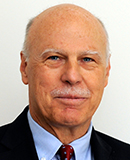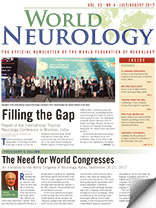
Prof. Dr. Wolfgang Grisold
My name is Prof. Dr. Wolfgang Grisold, and I am a neurologist working in Vienna, Austria. After serving as the secretary general for the past four years and also the treasurer of the WFN from 2013 to 2015, I would like to stand for election for president of the WFN.
My motivation to do so involves two concerns. On the one hand, I want to ensure continuity of successful projects and cooperations. On the other hand, based on the conversations I have had with neurologists all over the world, I see the need to improve and further develop the infrastructure to support and empower neurologists on regional and global levels.
Before outlining my agenda as the president of the WFN, let me provide a few notes about myself.
My focus is on general neurology, neuro-oncology, neuromuscular disease, palliative care, and education. In these fields, I have contributed to over 200 peer-reviewed articles, and I have published five books. I participated in two EU projects.
I have always been interested in education-related work. I have been part of several education committees, and I chaired the development of the “European board examination” and the WFN teaching course committee. I am also involved in European CME accreditation.
I held several positions in national and international societies, such as EFNS, UEMS, EANO, ECCO, ACOE, and WFN. I organized a number of international congresses, such as EFNS 2002 and EANO 2006, and co-organized WCN 2013. Presently, I am involved in the organization of the international congress on neuromuscular disease, in 2018 in Vienna.
My activities at the WFN began in 2004 as a member of the education committee, which I presently co-chair with Steven Lewis, MD. I have been a WFN trustee since 2009, and I was elected the secretary general and treasurer in Vienna in 2013. After these positions were separated in 2015, I stayed in the role of the secretary general.
In this position, I have been involved in operational and administrative tasks on the micro and macro levels. This provided me with deep and valuable insights into the administrative structures and the widespread network of the WFN.
At the same time, I had the opportunity to shape, plan, and realize a variety of projects of the WFN. The policy to reach out, the empowerment of regions, and the efforts toward cooperation with international organizations have always been in the center of these efforts.
The WFN has been steadily increasing its influence, and I believe that the two most crucial factors for this development have been continuity of reliable structures and projects, and, furthermore, excellent collaboration of trustees and committees across regions, global networks, research groups, and, importantly, large political bodies, such as the WHO.
As a president, I will further strengthen these developments. The overarching theme of my agenda will be to support neurology worldwide, making neurologic services available, and helping to reduce the treatment gap for neurological patients. This agenda entails the following concrete steps:
- Education on all levels will be an important goal. I will continue the present efforts, such as the Junior Traveling Fellowships, grants, joint courses with other societies such as the EAN, and Continuum with the AAN. The WFN has successfully implemented Department Visits and Training Centers. The three Teaching Centers in Africa and one in Mexico were important steps, which will increasingly need more support for trainees. I believe that the Teaching Center concept will need to spread to Asia.
- The establishment of WFN educational standards of training and assessment will be helpful in countries with a developing neurological society. The focus will continue to be placed on educational activities for countries in need.
- Communication is one of the most important tasks in global societies. The website and social media have greatly improved and will continue to be the backbone of the WFN communication.
- The existing publications, such as the JNS, eNS and, the newsletter World Neurology will continue to play an important role in communicating the WFN’s aims, messages, and achievements. Another good example of successful communication is World Brain Day, which is an excellent yearly presentation of neurology worldwide.
Furthermore, I will support the development of new tools, such as a globally accessible e-learning platform for neurologists.
To ensure the continuation of administration, I find it important to collaborate with experienced persons from the present and past administrations to help with advice and action. As a concrete step, I suggest to modify the present change of administration by nominating a president-elect in advance and keeping the past president for another year. I believe that this step is crucial to maintain continuation in such a large and globally involved organization as the WFN.
Furthermore, I will aim to have organizational advisers who have experience with charity work, and I also plan to implement a patient’s voice in the WFN leadership.
One important activity of the WFN is the biennial WCN congress, which rotates from region to region. This mission is aimed to foster and support the African, South American, and Asian regions, and support the presence and activities of neurology in regions in need. I am committed to this principle of rotation so that different regions will benefit from the WCN congresses.
Of course, besides these points, there are a number of other aspects that will play an important role. The WFN must engage in patient-related issues such as patient advocacy, long-term, and palliative care. I will make these tasks a future mission. Furthermore, in order to realize projects and ensure a smooth administration, the WFN will require financial resources. Thus, there might be the need for new strategic cooperations and alliances.
To summarize, as a president of the WFN, I would like to continue successful projects and cooperations. At the same time, I would encourage new developments and cooperations with member societies and neurologists all around the world, where I will place special attention on communication, education, and partnership.
In doing so, I will emphasize strategic project management and empowering leadership across the network of the WFN. This, in turn, would be grounded in transparency and a multidisciplinary and multiprofessional approach.
I am confident that the insights I gained at the WFN will provide strong grounds for succeeding in my mission. I would be grateful for your support.
